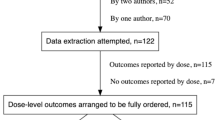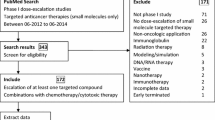Abstract
Clinical trials of new anticancer therapies are critically important tools in the search for more effective cancer treatments. According to the current paradigm for the clinical evaluation of new cancer therapies, (A) the dose of a therapeutic agent is not adjusted to accommodate individual patient differences, and (B) the exploration of a working-dose of new cancer therapies is mainly restricted to phase I trials. Rogatko et al. proposed that (A′) the dose should be finetuned using patient-specific attributes, and (B′) the search for the optimal dose should be extended beyond phase I and into phases II and III.
In this paper, we discuss how phase I design methods can be used to update the working dose for phases II and III and how finetuning the dose may involve the utilization of patient-specific attributes to obtain a personalized treatment regimen. As a result, we expect that more patients will be treated with potentially therapeutic doses of promising agents and fewer patients will have to experience the detrimental effects of a toxic dose.

Similar content being viewed by others
References
Roberts Jr TG, Goulart BH, Squitieri L, et al. Trends in the risks and benefits to patients with cancer participating in phase 1 clinical trials. JAMA 2004 Nov 3; 292 (17): 2130–40
National Cancer Institute. Search for clinical trials: advanced search [online]. http://www.cancer.gov/Search/SearchClinicalTrialsAdvanced.aspx [Accessed 2008 Dec 5]
Raymond E, Boige V, Faivre S, et al. Dosage adjustment and pharmacokinetic profile of irinotecan in cancer patients with hepatic dysfunction. J Clin Oncol 2002 Nov 1; 20 (21): 4303–12
Meyerhardt JA, Kwok A, Ratain MJ, et al. Relationship of baseline serum bilirubin to efficacy and toxicity of single-agent irinotecan in patients with metastatic colorectal cancer. J Clin Oncol 2004 Apr 15; 22 (8): 1439–46
Poole C, Gardiner J, Twelves C, et al. Effect of renal impairment on the pharmacokinetics and tolerability of capecitabine (Xeloda) in cancer patients. Cancer Chemother Pharmacol 2002 Mar; 49 (3): 225–34
Valero V, Holmes FA, Walters RS, et al. Phase II trial of docetaxel: a new, highly effective antineoplastic agent in the management of patients with anthracyclineresistant metastatic breast cancer. J Clin Oncol 1995 Dec; 13 (12): 2886–94
Salminen E, Bergman M, Huhtala S, et al. Docetaxel: standard recommended dose of 100 mg/m(2) is effective but not feasible for some metastatic breast cancer patients heavily pretreated with chemotherapy. A phase II single-center study. J Clin Oncol 1999 Apr; 17 (4): 1127
Daugherty C, Ratain MJ, Grochowski E, et al. Perceptions of cancer patients and their physicians involved in phase I trials. J Clin Oncol 1995 May; 13 (5): 1062–72
Meropol NJ, Weinfurt KP, Burnett CB, et al. Perceptions of patients and physicians regarding phase I cancer clinical trials: implications for physician-patient communication. J Clin Oncol 2003 Jul 1; 21 (13): 2589–96
O’Quigley J, Pepe M, Fisher L. Continual reassessment method: a practical design for phase 1 clinical trials in cancer. Biometrics 1990 Mar; 46 (1): 33–48
Whitehead J. Bayesian decision procedures with application to dose-finding studies. Int J Pharm Med 1997; 11: 201–8
Gatsonis C, Greenhouse JB. Bayesian methods for phase I clinical trials. Stat Med 1992 Jul; 11 (10): 1377–89
Babb J, Rogatko A, Zacks S. Cancer phase I clinical trials: efficient dose escalation with overdose control. Stat Med 1998 May 30; 17 (10): 1103–20
Rosenberger WF, Haines LM. Competing designs for phase I clinical trials: a review. Stat Med 2002; 21 (18): 2757–70
Ting N, editor. Dose finding in drug development. 1st ed. New York: Springer, 2006
Faries D. Practical modifications of the continual reassessment method for phase I cancer clinical trials. J Biopharm Stat 1994 Jul; 4 (2): 147–64
Goodman SN, Zahurak ML, Piantadosi S. Some practical improvements in the continual reassessment method for phase I studies. Stat Med 1995 Jun 15; 14 (11): 1149–61
Möller S. An extension of the continual reassessment methods using a preliminary up-and-down design in a dose finding study in cancer patients, in order to investigate a greater range of doses. Stat Med 1995 May 15–30; 14 (9s-10): 911–22; discussion 23
Piantadosi S, Fisher JD, Grossman S. Practical implementation of a modified continual reassessment method for dose-finding trials. Cancer Chemother Pharmacol 1998; 41 (6): 429–36
Storer BE. An evaluation of phase I clinical trial designs in the continuous dose-response setting. Stat Med 2001 Aug 30; 20 (16): 2399–408
Zacks S, Rogatko A, Babb J. Optimal Bayesian-feasibile dose escalation for cancer phase I trials. Stat Prob Ltrs 1998; 38: 215–20
Babb JS, Rogatko A. Patient specific dosing in a cancer phase I clinical trial. Stat Med 2001 Jul 30; 20 (14): 2079–90
Tighiouart M, Rogatko A, Babb JS. Flexible Bayesian methods for cancer phase I clinical trials: dose escalation with overdose control. Stat Med 2005 Jul 30; 24 (14): 2183–96
Garrett-Mayer E. The continual reassessment method for dose-finding studies: a tutorial. Clin Trials 2006; 3 (1): 57–71
Zohar S, Latouche A, Taconnet M, et al. Software to compute and conduct sequential Bayesian phase I or II dose-ranging clinical trials with stopping rules. Comput Methods Programs Biomed 2003 Oct; 72 (2): 117–25
Xu Z, Tighiouart M, Rogatko A. EWOC 2.0: interactive software for dose escalation in cancer phase I clinical trials. Drug Info J 2007; 4 (12): 221–8
Rogatko A, Tighiouart M, Zhiheng X. EWOC 2.0 application software [online]. Available from URL: http://sisyphus.emory.edu/software_ewoc.php [Accessed 2008 Dec 8]
Decoster G, Stein G, Holdener EE. Responses and toxic deaths in phase I clinical trials. Ann Oncol 1990; 1 (3): 175–81
Dillman RO, Koziol JA. Phase I cancer trials: limitations and implications. Mol Biother 1992 Sep; 4 (3): 117–21
Smith TL, Lee JJ, Kantarjian HM, et al. Design and results of phase I cancer clinical trials: three-year experience at M.D. Anderson Cancer Center. J Clin Oncol 1996 Jan; 14 (1): 287–95
Eisenhauer EA, O’Dwyer PJ, Christian M, et al. Phase I clinical trial design in cancer drug development. J Clin Oncol 2000 Feb; 18 (3): 684–92
Rogatko A, Schoeneck D, Jonas W, et al. Translation of innovative designs into cancer phase I trials. J Clin Oncol 2007; 25 (31): 4982–6
Dixon WJ, Mood AM. A method for obtaining and analyzing sensitivity data. J Am Stat Assoc 1948; 43 (241): 109–26
Potter DM. Adaptive dose finding for phase I clinical trials of drugs used for chemotherapy of cancer. Stat Med 2002 Jul 15; 21 (13): 1805–23
O’Quigley J, Shen LZ. Continual reassessment method: a likelihood approach. Biometrics 1996 Jun; 52 (2): 673–84
Storer BE. Design and analysis of phase I clinical trials. Biometrics 1989 Sep; 45 (3): 925–37
Ivanova A. A new dose-finding design for bivariate outcomes. Biometrics 2003 Dec; 59 (4): 1001–7
O’Quigley J. Sequential design and analysis of dose finding studies in patients with life threatening disease. Fundam Clin Pharmacol 1990; 4 Suppl. 2: 81s–91s
Cheung YK. Coherence principles in dose-finding studies. Biometrika 2005; 92 (4): 863–73
Piantadosi S, Liu G. Improved designs for dose escalation studies using pharmacokinetic measurements. Stat Med 1996 Aug 15; 15 (15): 1605–18
Wijesinha MC, Piantadosi S. Dose-response models with covariates. Biometrics 1995 Sep; 51 (3): 977–87
Newell DR. Pharmacologically based phase I trials in cancer chemotherapy. Hematol Oncol Clin North Am 1994 Apr; 8 (2): 257–75
Cheng JD, Babb JS, Langer C, et al. Individualized patient dosing in phase I clinical trials: the role of EWOC in PNU-214936. J Clin Oncol 2004; 22 (4): 602–9
Yamamoto N, Tamura T, Fukuoka M, et al. Survival and prognostic factors in lung cancer patients treated in phase I trials: Japanese experience. Int J Oncol 1999 Oct; 15 (4): 737–41
Bachelot T, Ray-Coquard I, Catimel G, et al. Multivariable analysis of prognostic factors for toxicity and survival for patients enrolled in phase I clinical trials. Ann Oncol 2000 Feb; 11 (2): 151–6
Rogatko A, Babb JS, Wang H, et al. Patient characteristics compete with dose as predictors of acute treatment toxicity in early phase clinical trials. Clin Cancer Res 2004 Jul 15; 10 (14): 4645–51
Rogatko A, Babb JS, Tighiouart M, et al. New paradigm in dose-finding trials: patient-specific dosing and beyond phase I. Clin Cancer Res 2005 Aug 1; 11 (15): 5342–6
Acknowledgements
This paper was supported in part by grants from Georgia Cancer Coalition, Distinguished Cancer Clinicians and Scientists Program (to Dr Rogatko), Robert W. Woodruff Health Sciences Center Fund (to Dr Rogatko), and NIH/ NCI Grants No. 1 P01 CA116676 (to Drs Rogatko and Tighiouart) and P20 CA103735 (to Dr Rogatko).
The authors have no conflicts of interest that are directly relevant to the content of this review.
Author information
Authors and Affiliations
Corresponding author
Rights and permissions
About this article
Cite this article
Rogatko, A., Ghosh, P., Vidakovic, B. et al. Patient-Specific Dose Adjustment in the Cancer Clinical Trial Setting. Pharm Med 22, 345–350 (2008). https://doi.org/10.1007/BF03256730
Published:
Issue Date:
DOI: https://doi.org/10.1007/BF03256730




